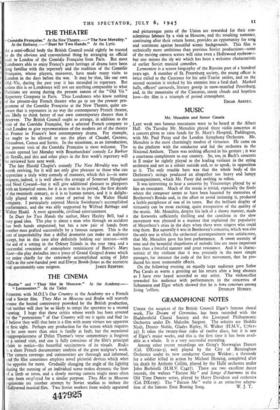THE THEATRE
Comedie Frangaise." At the New Theatre.—" The New Morality." At the Embassy.—" Duet for Two Hands." At the Lyric.
As a semi-official body the British Council could rightly be trusted to do the obvious and conventional thing by arranging an official visit to London of the Comedie Francaise from Paris. But most Londoners able to enjoy France's great heritage of drama have been long familiar with the repertory and the tradition of the Comedic Francaise, whose players, moreover, have made many visits to
London in the days before the war. It may be like our own Old . Vic, during the past year it has extended its repertory. But unless this is so Londoners will not see anything comparable to what Parisians are seeing during the present season of the " Old Vic " Repertory Company in Paris. Thus Londoners who know nothing of the present-day French theatre who go to see the present pro- gramme of the Comedic Francaise at the New Theatre, quite un- aware that it represents in no way the contemporary French theatre, are likely to think better of our own contemporary theatre than it deserves. The British Council ought to arrange, in addition to the visit of the Comedic Francaise, for a selected French company to visit London to give representations of the modern art of the theatre in France in France's best contemporary drama. For example, we ought to be allowed to see. the plays of Claudel, Cocteau, Giraudoux, Camus and Sartre. In the meantime, as an introduction, the present visit of the Comedic Francaise is most welcome. The season opened last Monday with Beaumarchais' comedy Le Barbier de Seville, and this and other plays in the first week's repertory will be reviewed here next week.
The late Harold Chapin's comedy The New Morality was well worth reviving, for it will not only give pleasure to those who can appreciate a truly witty comedy of manners, which this is—in some respects, indeed, it is well above the average of Somerset Maugham and Noel Coward—but it will give additional pleasure to playgoers with an historical sense, for it is as true to its period, the first decade of the twentieth century, as it is to human nature, and it is delight- fully played with a nice sense of period by the Walter Hudd company. I particularly enjoyed Mercia Swinburne's accomplished performance, and she was ably supported by Wilfred Babbage and Walter Hudd. A most agreeable, civilised entertainment.
In Duet for Two Hands the author, Mary Hayley Bell, had a very good idea. The play is about a man who through an accident has both hands amputated, but has a new pair of hands from another man grafted successfully by a famous surgeon. This is the sort of improbability that a skilful dramatist can make an audience accept, but in this case after definitely holding our interest—with the aid of a setting in the Orkney Islands in the year 1904 and a successful evocation of atmosphere reminiscent of Barrie's Mary Rose—the play dwindles into a piece of Grand Guignol drama which we enjoy chiefly for the extremely accomplished acting of John Mills as the new-handed poet and Elwyn Brook-Jones as the eccentric




























 Previous page
Previous page